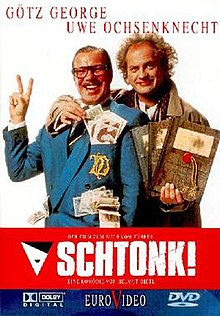
Hermann Wilhelm Göring was a German politician, military leader, and convicted war criminal. He was one of the most powerful figures in the Nazi Party, which governed Germany from 1933 to 1945.
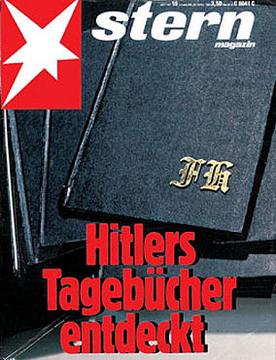
The Hitler Diaries were a series of sixty volumes of journals purportedly written by Adolf Hitler, but forged by Konrad Kujau between 1981 and 1983. The diaries were purchased in 1983 for 9.3 million Deutsche Marks by the West German news magazine Stern, which sold serialisation rights to several news organisations. One of the publications involved was The Sunday Times, who asked their independent director, the historian Hugh Trevor-Roper, to authenticate the diaries; he did so, pronouncing them genuine. At the press conference to announce the publication, Trevor-Roper announced that on reflection he had changed his mind, and other historians also raised questions concerning their validity. Rigorous forensic analysis, which had not been performed previously, quickly confirmed that the diaries were fakes.

Konrad Paul Kujau was a German illustrator and forger. He became famous in 1983 as the creator of the so-called Hitler Diaries, for which he received DM 2.5 million from a journalist, Gerd Heidemann, who in turn sold it for DM 9.3 million to the magazine Stern, resulting in a net profit of DM 6.8 million for Heidemann. The forgery resulted in a four-and-half-year prison sentence for Kujau.
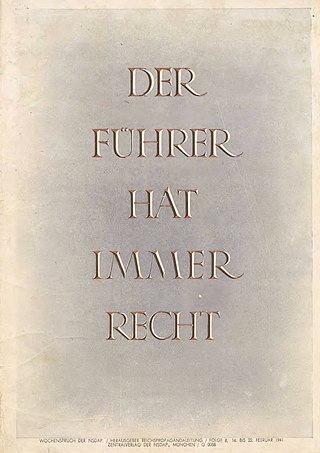
In the political history of Germany, the Führerprinzip was the basis of executive authority in the government of Nazi Germany (1933–1945), which meant that the word of the Führer is above all written law, and that government policies, decisions, and offices all work towards the realisation of the will of the Führer. In practice, the Führerprinzip was the dictatorship of the leader to dictate the ideology and policies of a political party; therefore, such a personal dictatorship is a basic characteristic of Nazism.

Christiane Hörbiger was an Austrian stage, film, and television actress. Her first major film role was Mary Vetsera in Kronprinz Rudolfs letzte Liebe in 1955. She appeared on the stage of the Burgtheater as Recha in Lessing's Nathan der Weise in 1959, became a member of Theater Heidelberg and later Schauspielhaus Zürich. From 1969 to 1972, she portrayed Die Buhlschaft in Hofmannsthal's Jedermann at the Salzburg Festival.
Gerd Heidemann is a German journalist best known for his role in the publication of purported Hitler Diaries that were subsequently proved to be forgeries.

Karl Friedrich Otto Wolff was a senior German SS officer who served as Chief of Personal Staff Reichsführer-SS and an SS liaison to Adolf Hitler during World War II. He ended the war as the Supreme SS and Police Leader in occupied Italy and helped arrange for the early surrender of Axis forces in that theatre, effectively ending the war there several days sooner than in the rest of Europe. He escaped prosecution at the Nuremberg Trials as a result of his participation in Operation Sunrise. In 1962, Wolff was rearrested, prosecuted in West Germany for the deportation of Polish Jews and sentenced to 15 years in prison for being an accessory to murder in 1964. He was released in 1971 and died 13 years later.
The early timeline of Nazism begins with its origins and continues until Hitler's rise to power.

The Blood Order, officially known as the Decoration in Memory of 9 November 1923, was one of the most prestigious decorations in the Nazi Party (NSDAP). During March 1934, Hitler authorized the Blood Order to commemorate the 9 November 1923 coup attempt of the Nazi Party. The medal is silver, with the obverse bearing a depiction of an eagle grasping an oak leaf wreath. Inside the wreath is the date 9.Nov. and to the right is the inscription München 1923–1933. The reverse shows the entrance of the Feldherrnhalle in relief, and directly above is the angled swastika with sun rays in the background. Along the top edge is the inscription: UND IHR HABT DOCH GESIEGT.
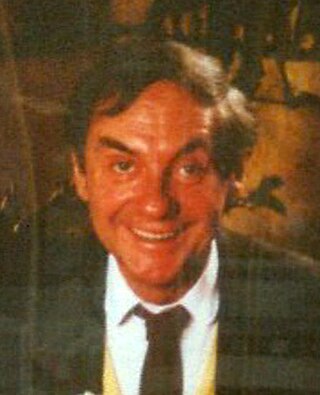
Harald Juhnke, was a German actor, comedian, and singer.

Der Sieg des Glaubens is the first Nazi propaganda film directed by Leni Riefenstahl. Her film recounts the Fifth Party Rally of the Nazi Party, which occurred in Nuremberg, Germany, from 30 August to 3 September 1933. The film is of great historic interest because it shows Adolf Hitler and Ernst Röhm on close and intimate terms, before Hitler had Röhm killed during the Night of the Long Knives on 1 July 1934. As he then sought to remove Röhm from German history, Hitler ordered all known copies of the film be destroyed, and it was considered lost until a surviving copy was found in the 1980s in East Germany.

Götz Otto is a German film and television actor who is known internationally for his roles as henchman Richard Stamper in the 1997 James Bond film Tomorrow Never Dies, as Adolf Hitler's adjutant Otto Günsche in the 2004 World War II film Downfall, and as Nazi commander Klaus Adler in the 2012 comic science fiction film Iron Sky.

The Führermuseum or Fuhrer-Museum, also referred to as the Linz art gallery, was an unrealized art museum within a cultural complex planned by Adolf Hitler for his hometown, the Austrian city of Linz, near his birthplace of Braunau. Its purpose was to display a selection of the art bought, confiscated or stolen by the Nazis from throughout Europe during World War II. The cultural district was to be part of an overall plan to recreate Linz, turning it into a cultural capital of Nazi Germany and one of the greatest art centers of Europe, overshadowing Vienna, for which Hitler had a personal distaste. He wanted to make the city more beautiful than Budapest, so it would be the most beautiful on the Danube River, as well as an industrial powerhouse and a hub of trade; the museum was planned to be one of the greatest in Europe.

The Reichssicherheitsdienst was an SS security force of Nazi Germany. Originally bodyguards for Adolf Hitler, it later provided men for the protection of other high-ranking leaders of the Nazi regime. The group, although similar in name, was completely separate from the Sicherheitsdienst (SD), which was the formal intelligence service for the SS, the Nazi Party and later Nazi Germany.

The government of Nazi Germany was a totalitarian dictatorship governed by Adolf Hitler and the Nazi Party according to the Führerprinzip. Nazi Germany was established in January 1933 with the appointment of Adolf Hitler as Chancellor of Germany, followed by suspension of basic rights with the Reichstag Fire Decree and the Enabling Act which gave Hitler's regime the power to pass and enforce laws without the involvement of the Reichstag or German president, and de facto ended with Germany's surrender in World War II on 8 May 1945 and de jure ended with the Berlin Declaration on 5 June 1945.

Nuremberg: Nazis on Trial, is a BBC documentary film series consisting of three one-hour films that re-enact the Nuremberg War Trials of Albert Speer, Hermann Göring, and Rudolf Hess. They were broadcast on BBC Two in 2006 to coincide with the 60th anniversary of the trials. In 2015, American Heroes Channel aired the film under an alternate title, "Nuremberg: Nazi Judgement Day".
The Reich Chancellery meeting of 12 December 1941 was an encounter between Adolf Hitler and the highest-ranking officials of the Nazi Party. Almost all important party leaders were present to hear Hitler declare the ongoing destruction of the Jewish race, which culminated in the Holocaust. The meeting is less known than the later Wannsee Conference.

Edda Carin Wilhelmine Göring was the only child of German politician, military leader, and leading member of the Nazi Party Hermann Göring, by his second marriage to the German actress Emmy Sonnemann.
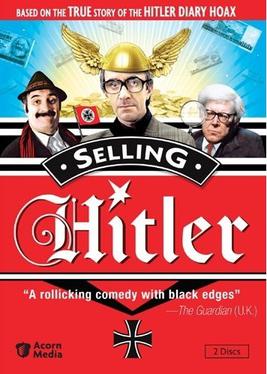
Selling Hitler is a 1991 ITV television comedy-drama mini-series about the Hitler Diaries hoax and was based on Robert Harris's 1986 book Selling Hitler: The Story of the Hitler Diaries.
Faking Hitler is a German television miniseries that was released on RTL+ on 30 November 2021. It is a partial dramatization of the events surrounding the publication of the forged Hitler Diaries in the early 1980s. The title Faking Hitler was interpreted as an allusion to the book Selling Hitler: The Story of the Hitler Diaries (1986) by Robert Harris and the 1991 series of the same name.
